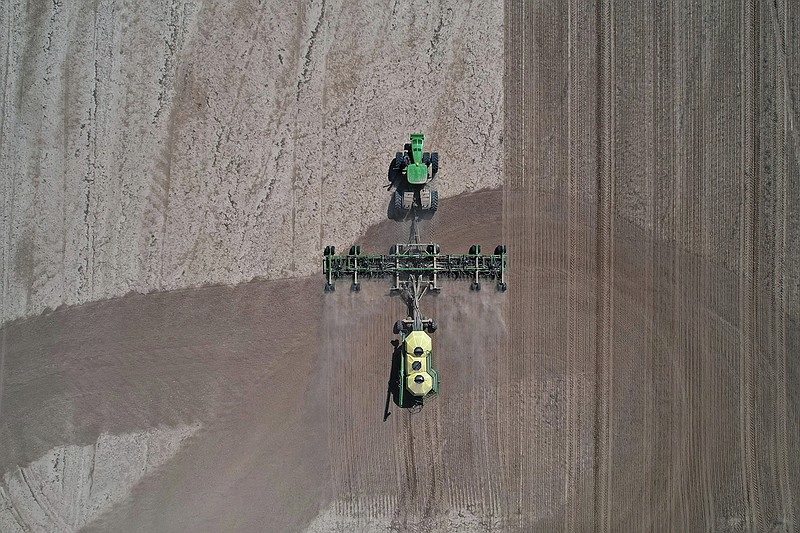WASHINGTON — Members of the U.S. Senate Agriculture, Nutrition and Forestry Committee continued their review of the current farm bill on Thursday with a hearing on risk management and credit access programs.
The Subcommittee on Commodities, Risk Management and Trade invited community financial and credit leaders to testify about assistance programs under the agricultural law. Thursday’s hearing marked the subcommittee’s second of the week; farming and ranching leaders testified Tuesday on insurance and support programs.
“Hearing directly from you is incredibly important,” Sen. Tina Smith, D-Minn., the subcommittee’s chair, told Thursday’s witnesses. “As the folks closest to the work, you know best what’s working and what we can do to make it work better.”
Thursday’s hearing on the farm bill — a sweeping law covering agricultural, nutrition and rural development programs — concerned its titles on credit access and crop insurance. Under the latest farm bill farmers and ranchers can seek government loans, and the current law provides guarantees for private lenders. The federal crop insurance program includes policies covering yield losses and declines in crop and whole farm revenue.
“Crop insurance is essential for farmers and lenders, as it allows producers to qualify for operating loans. With extremely tight margins and incredible risks in agriculture, bank regulators insist borrowers have crop insurance to repay their loans,” Gus Barker of Newell, Iowa, representing the Independent Community Bankers of America, testified.
“Insurance payments may not be large enough to make farms whole, but they are enough to keep farmers intact to survive another year.”
Jase Wagner of Sun Prairie, Wisc., representing the Farm Credit Council, said federal risk management programs are “well suited for their purpose” in providing stability to farmers and ranchers, yet there are too many gaps for new farmers.
“Traditional ag is plentiful for traditional, well-served farmers. Young and beginning [farmers] need more help,” he said.
Addressing a question by Sen. John Boozman, R-Ark., Wagner said it is important for farmers to have “many different options” of capital to alleviate inflationary and cost-related problems. He noted institutions are interested in making programs more adaptable to changing conditions, referencing the 1980s farm crisis involving swinging land and commodity prices.
“We haven’t had significant inflation since the ’80s, and many of programs and structures were not set up with those in mind,” he told Boozman regarding the present day. “I think this is a great opportunity to relook at some of those options and provide that flexibility up and possibly down as you see things move over time.”
Phillip Morgan of Ridgeland, Miss.— also representing the Farm Credit Council — emphasized the importance of maintaining programs to minimize risks facing producers.
“As we see their balance sheets begin to decline and we see their equity begin to deteriorate based on high costs and declining margins and so forth, it is just critical that we continue to have the safety net in the farm bill,” he said, “that those producers are in some ways assured that that safety net is there.”
Senate and House of Representatives members have held multiple hearings to review the standing farm bill and understand changes to implement in new legislation. The current law, enacted in December 2018, will expire Sept. 30.
“We are not as partisan as in some other spaces,” Smith said of the Senate committee. “I hope that this hearing this week — all of the hearings we did this week — will help to inform us as we build a bipartisan farm bill that meets the needs of farmers and ranchers and small towns and rural places all across the country.”
Boozman — the full committee’s top Republican — mentioned the farm bill during Wednesday’s Senate Environment and Public Works Committee hearing on the U.S. Army Corps of Engineers’ budget and water resources projects.
“It comes to mind 40% of the products in Arkansas are exported. That’s true throughout most of the country,” the senator said. “Our inland waterways — our ports and harbors — are so vital.”
Michael Connor, the assistant secretary of the Army for Civil Works, said the economic importance of waterways was apparent last year when portions of the Mississippi River reached record-low levels, impeding efforts to transport products.
“I think we had great communication and resources to keep the system dredged and moving, but we also want to lessons learned and make sure we’re continuing to try and ensure that the next drought doesn’t have as deep as an impact,” he said.
During Wednesday’s hearing, Boozman expressed confidence in Congress’ ability to move on a farm bill.
“We’re going to get it passed this year,” he said.
